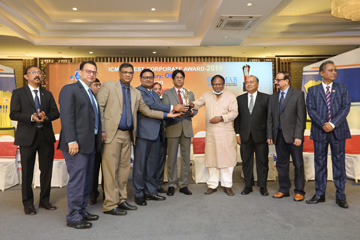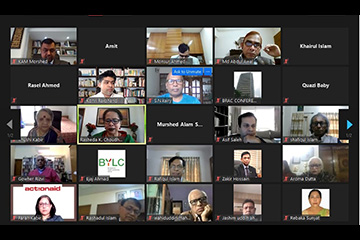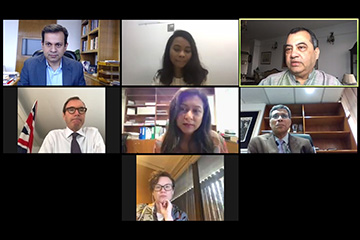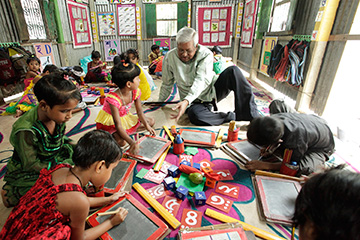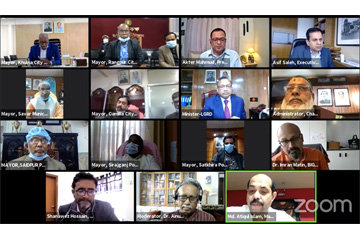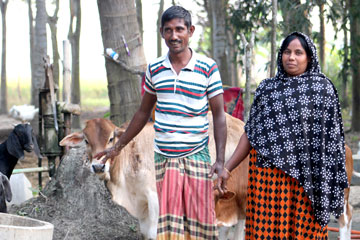
English (961)
Children categories
BRAC wins ICMAB Best Corporate Award

The Institute of Cost & Management Accountants of Bangladesh (ICMAB) has awarded BRAC the first position in the ICMAB Best Corporate Award-2019.
BRAC, the number one NGO in the world, has secured Gold Award under NGO Category in the competition.
Tipu Munshi MP, Hon’ble Minister, Ministry of Commerce, Government of People’s Republic of Bangladesh handed over the award to Ashit Baran Das, Associate Director (Finance & Accounts) of BRAC at a ceremony organized at Radisson Blu Dhaka Water Garden in Dhaka today evening (Thursday, February 25, 2021).
Professor Shibli Rubayat-Ul-Islam, Chairman, Bangladesh Securities and Exchange Commission (BSEC), Dr. Md Jafar Uddin, Secretary, Ministry of Commerce, Government of People’s Republic of Bangladesh, Sheikh Fazle Fahim, President, The Federation of Bangladesh Chambers of Commerce and Industry (FBCCI), A.K.M. Delwar Hussain FCMA, President, South Asian Federation of Accountants (SAFA) were also present as the special guests in the event.
BRAC received many awards in the field of financial transparency in different times including Institute of Chartered Accountants of Bangladesh (ICAB) National Award under the category of NGOs, Institute of Cost and Management Accountants of Bangladesh (ICMAB) Best Corporate Award in the NGO category, and prestigious South Asian Federation of Accountants (SAFA) award for best presented annual report in the non-governmental organisation category.
৬ষ্ঠ ব্র্যাক মাইগ্রেশন মিডিয়া অ্যাওয়ার্ড

বাংলাদেশের উন্নয়ন এবং সমৃদ্ধির ক্ষেত্রে অভিবাসন খাতটি অত্যন্ত গুরুত্বপূর্ণ। জাতিসংঘের সর্বশেষ পরিসংখ্যান অনুযায়ী ২৭২ মিলিয়ন মানুষ (বিশ্ব জনসংখ্যার ৩.৫%) কাজের জন্য বা অন্য কোনো প্রয়োজনে নিজ দেশে বাস না করে অন্য দেশে বাস করছেন এবং উভয় দেশেরই আর্থ-সামাজিক উন্নয়নে গুরুত্বপূর্ণ অবদান রেখে চলেছেন।
কোভিড ১৯ মহামারীর কারণে বিশ্বব্যাপী প্রবাসী আয় নিম্নমুখী হলেও বাংলাদেশি প্রবাসীরা এই মহামারীর মধ্যেই রেমিট্যান্স পাঠানোর ক্ষেত্রে গড়েছে নতুন রেকর্ড। ২০১৯ সালে যেখানে দেশে মোট প্রবাসী আয় এসেছিল ১ লাখ ৫৫ হাজার ৫৫৩ কোটি টাকা সেখানে ২০২০ সালে এসেছে ১ লাখ ৮৪ হাজার ৩৫৫ কোটি টাকা (তথ্যসূত্র: বাংলাদেশ ব্যাংক)।
বাংলাদেশকে আর্থিকভাবে সমৃদ্ধ করতে প্রবাসী আয় অত্যন্ত গুরুত্বপূর্ণ ভূমিকা পালন করলেও প্রয়োজনীয় তথ্যের অভাবে অভিবাসন প্রত্যাশীরা প্রায়শই প্রতারণার সম্মুখীন হচ্ছেন। বিশ্বের সর্ববৃহৎ বেসরকারি উন্নয়ন সংস্থা হিসেবে ব্র্যাক বাংলাদেশের অভিবাসনপ্রবণ জেলাগুলোতে নিরাপদ অভিবাসন নিশ্চিত, মানবপাচার প্রতিরোধ ও সচেতনতা সৃষ্টি এবং বিদেশফেরত অভিবাসীদের পুনরেকত্রীকরণের লক্ষ্যে কাজ করে যাচ্ছে। প্রতিবছর প্রবাস থেকে অনেক মানুষ দেশে ফেরত আসে। কিন্তু তাদের পুনরেকত্রীকরণের বিষয়টি একেবারে উপেক্ষিত থেকে যায়। বিষয়টির গুরুত্ব বিবেচনা কওে ব্র্যাক ড্যানিশ দূতাবাসের সহায়তায় ‘সোশিও-ইকোনোমিক রিইন্টিগ্রেশন অব রিটার্নি মাইগ্রেন্ট ওয়ার্কার্স অব বাংলাদেশ’ প্রকল্পটি বাস্তবায়ন করছে। যে প্রকল্পের অধীনে বিদেশফেরত অভিবাসীদের বিভিন্নভাবে সহযোগিতা দেওয়া হচ্ছে।
দেশের উন্নতি ও সমৃদ্ধিতে গুরুত্বপূর্ণ অবদান রাখা অভিবাসী কর্মী ও তাদের পরিবারের অধিকার রক্ষায় গণমাধ্যমের ভূমিকা অনস্বীকার্য। অভিবাসনবিষয়ক সাংবাদিকতাকে আনুষ্ঠানিকভাবে স্বীকৃতি দিতে ব্র্যাক ২০১৫ সাল থেকে ‘ব্র্যাক মাইগ্রেশন মিডিয়া অ্যাওয়ার্ড’ প্রবর্তন করে। এরই ধারাবাহিকতায় অভিবাসন বিষয়ক সাংবাদিকতাকে অনুপ্রাণিত করতে ষষ্ঠবারের মতো ‘ব্র্যাক মাইগ্রেশন মিডিয়া অ্যাওয়ার্ড’ প্রদান করা হবে।
যেসব বিভাগে/ক্যাটাগরিতে ‘৬ষ্ঠ ব্র্যাক মাইগ্রেশন মিডিয়া অ্যাওয়ার্ড’ প্রদান করা হবে
(ক) সংবাদপত্র (জাতীয়): অভিবাসন বিষয়ে দেশে ও বিদেশে যে কোনো জাতীয় সংবাদপত্রে প্রকাশিত প্রতিবেদন।
(খ) সংবাদপত্র (আঞ্চলিক): অভিবাসন বিষয়ে বাংলাদেশের যে কোনো আঞ্চলিক সংবাদপত্রে প্রকাশিত প্রতিবেদন।
(গ) অনলাইন: অভিবাসন বিষয়ে দেশে ও বিদেশে যে কোনো অনলাইন পত্রিকায় প্রকাশিত প্রতিবেদন।
(ঘ) টেলিভিশন সংবাদ: অভিবাসন বিষয়ে দেশে ও বিদেশে যে কোনো টেলিভিশনে সম্প্রচারিত অনুসন্ধানী প্রতিবেদন।
(ঙ) টেলিভিশন অনুষ্ঠান: অভিবাসন বিষয়ে দেশে ও বিদেশে যে কোনো টেলিভিশনে সম্প্রচারিত অনুসন্ধানমূলক অনুষ্ঠান।
(চ) রেডিও: অভিবাসন বিষয়ে দেশে ও বিদেশে যে কোনো রেডিওতে সম্প্রচারিত অনুষ্ঠান/প্রতিবেদন।
(ছ) আলোকচিত্র: অভিবাসন বিষয়ে দেশে ও বিদেশে যেকোনো গণমাধ্যমে প্রকাশিত আলোকচিত্র।
(জ) সোশ্যাল মিডিয়া: নিরাপদ অভিবাসন প্রতিষ্ঠায় ভূমিকা রাখা মানসম্মত ফেসবুক পেজ/ব্যক্তিগত আইডি/ব্লগ বা ইউটিউব চ্যানেল।
(ঝ) সংবাদমাধ্যম প্রতিষ্ঠান: অভিবাসন বিষয়ে ভূমিকা রাখা প্রিন্ট/অনলাইন/টেলিভিশন।
প্রতিবেদন/অনুষ্ঠান/আলোকচিত্র/ সোশ্যাল মিডিয়া কনটেন্টসমূহ প্রকাশ বা প্রচারের সময়সীমা
দেশে অথবা প্রবাসে অবস্থানরত যেকোনো বাংলাদেশি সাংবাদিক ও গণমাধ্যম ব্যক্তিত্ব আবেদন করতে পারবেন। এছাড়া সোশ্যাল মিডিয়া ক্যাটাগরিতে যেকোনো বাংলাদেশি ব্যক্তি আবেদন করতে পারবেন। অভিবাসনবিষয়ক প্রতিবেদন/ অনুষ্ঠান/আলোকচিত্র/ ব্লগ/সোশ্যাল মিডিয়া কনটেন্টসমুহ অবশ্যই ১ জানুয়ারি ২০২০ থেকে ৩১ ডিসেম্বর ২০২০ এর মধ্যে প্রকাশিত/প্রচারিত হতে হবে।
প্রতিবেদন জমা দেওয়ার নিয়ম
সিরিজ রিপোর্ট ছাড়া কোনো প্রতিযোগী একই ক্যাটাগরিতে একের অধিক প্রতিবেদন জমা দিতে পারবেন না। তবে সিরিজ রিপোর্ট হলে পর্ব সংখ্যা এবং প্রকাশিত/প্রচারিত হওয়ার তারিখ উল্লেখপূর্বক সিরিজের সবগুলো প্রতিবেদন জমা দেওয়া যাবে।
যোগ্যতা ও সতর্কতা
মিডিয়া অ্যাওয়ার্ডের জন্য জমা দেওয়া প্রতিবেদন/অনুষ্ঠান/আলোকচিত্রসমূহের স্বত্বাধিকার নিশ্চিত করতে হবে। সংবাদপত্রে প্রকাশিত প্রতিবেদন/আলোকচিত্রসমূহের অনলাইন লিংক এবং টেলিভিশনে প্রচারিত প্রতিবেদন/অনুষ্ঠানের ইউটিউব লিংক (যদি থাকে) প্রতিবেদনের সঙ্গে জমা দিতে হবে। যদি অনলাইন লিংক বা ইউটিউব লিংক না থাকে সেক্ষেত্রে সংশ্লিষ্ট গণমাধ্যমের সম্পাদক/বার্তা সম্পাদক কর্তৃক নির্ধারিত সময়ের মধ্যে (১ জানুয়ারি ২০২০ থেকে ৩১ ডিসেম্বর, ২০২০) সংবাদ/অনুষ্ঠানটি প্রচারিত হয়েছে মর্মে (প্রকাশ/প্রচারের তারিখ উল্লেখসহ) সত্যায়নপত্র সংযুক্ত করতে হবে। সোশ্যাল মিডিয়ার ক্ষেত্রেও কন্টেন্টগুলো উল্লেখিত সময়ের মধ্যে প্রকাশিত/প্রচারিত হতে হবে। অসম্পূর্ণ/ভুল তথ্যসংবলিত আবেদন বাতিল বলে গণ্য হবে।
আবেদন করার শর্ত
১. অভিবাসন খাত, অভিবাসী ও শরণার্থী কিংবা তাদের পরিবারের অধিকার রক্ষায় গুরুত্বপূর্ণ ভূমিকা রাখে এমন প্রতিবেদন/অনুষ্ঠান/সোশ্যাল মিডিয়া কনটেন্ট (প্রকাশিত বা সম্প্রচারিত) হতে হবে।
২. সংবাদ প্রতিবেদন বা অনুষ্ঠানের ক্ষেত্রে দেশে বা প্রবাসে অবস্থানরত শুধু বাংলাদেশি সাংবাদিকরাই এই অ্যাওয়ার্ডের জন্য আবেদন করতে পারবেন।
৩. সোশ্যাল মিডিয়া কন্টেন্টের ক্ষেত্রে যেকোনো বাংলাদেশী ব্যক্তি আবেদন করতে পারবেন।
৪. আবেদনকারীকে অবশ্যই তাঁর জীবনবৃত্তান্ত যথাযথ ফরমেটের মাধ্যমে (ফরমেটগুলো সর্বশেষ পাতায় সংযুক্ত) পাঠাতে হবে। প্রয়োজনীয় নথি হিসেবে প্রতিবেদন, আলোকচিত্র যে মাধ্যমে প্রকাশিত হয়েছে তার বিবরণ জমা দিতে হবে।
৫. আবেদনকারী তাঁর কর্মজীবন সম্পর্কে অর্ধেক পাতার মধ্যে সংক্ষিপ্ত বিবরণ (বাংলা ও ইংরেজি ভাষায়) সংযুক্ত করে পাঠাবেন। সংযুক্ত ফরমেটটি পূরণ করে আবেদনপত্রের সঙ্গে পাঠাতে হবে।
৬. প্রিন্ট মিডিয়ার প্রতিবেদনের ক্ষেত্রে (জাতীয় ও স্থানীয় উভয় ক্ষেত্রে) সংবাদপত্রে প্রকাশিত মূল কপিটি প্রেরণ করতে হবে। সংবাদপত্রের এবং প্রতিবেদকের নাম ও তারিখ অবশ্যই দৃশ্যমান হতে হবে। সংযুক্তি হিসেবে প্রকাশিত কপি ছাড়াও সিডির মাধ্যমে সংবাদটির ওয়েব লিংক এবং সফটকপি জমা দিতে হবে।
৭. বেতারের ক্ষেত্রে এএম এবং এফএম বেতারতরঙ্গে সম্প্রচারিত অনুষ্ঠান অথবা প্রতিবেদন হতে হবে। এর সঙ্গে সংক্ষিপ্ত/সম্পূর্ণ স্ক্রিপ্ট যদি বর্তমান থাকে তবে জমা দিতে হবে। নিয়মিত বেতারে সম্প্রচারিত অনুষ্ঠানের অন্তত পরপর তিনটি অনুষ্ঠানের কপি জমা দিতে হবে।
৮. টেলিভিশনের ক্ষেত্রে অবশ্যই সম্পূর্ণ স্ক্রিপ্ট সহকারে প্রতিবেদনটি সিডি/ডিভিডির মাধ্যমে জমা দিতে হবে।
৯. অনলাইন মিডিয়ার ক্ষেত্রে প্রতিবেদনটি ওয়েবসাইটে প্রকাশিত হতে হবে এবং অনলাইনে যেভাবে প্রচারিত হয়েছে সেভাবে সংশ্লিষ্ট প্রতিবেদনটি স্ক্রিনশটসহ জমা দিতে হবে। এছাড়াও ইউআরএলসহ সফটকপি সিডিতে জমা দিতে হবে।
১০. আলোকচিত্রের ক্ষেত্রে আলোকচিত্রটি যেকোন মাধ্যমে প্রকাশিত হয়েছে তার কপি ও লিংক সংযুক্ত করতে হবে। গণমাধ্যমে যেভাবে প্রকাশিত হয়েছে ঠিক সেভাবেই সংশ্লিষ্ট আলোকচিত্রসহ প্রকাশিত প্রতিবেদনটি জমা দিতে হবে। হার্ডকপি ছাড়াও সফট কপি সংযুক্তি হিসেবে সিডি-র মাধ্যমে জমা দিতে হবে।
১১. সোশ্যাল মিডিয়ার ক্ষেত্রে ফেসবুক পেজ/ ব্যক্তিগত আইডি অথবা ইউটিউব চ্যানেলে প্রকাশিত অভিবাসন বিষয়ক অন্তত দশটি কন্টেন্টের লিংক এবং সোশ্যাল মিডিয়ায় যেভাবে প্রকাশিত হয়েছে সেভাবে স্ক্রিনশট দিয়ে পাঠাতে হবে। (২০২০ সালের ৩১ ডিসেম্বরের পর কন্টেন্টের কোন ধরনের সম্পাদনা গ্রহনযোগ্য হবে না)।
১২. সংবাদমাধ্যম প্রতিষ্ঠানের ক্ষেত্রে ২০২০ সালে অভিবাসন বিষয়ে তাদের যতগুলো গুরুত্বপূর্ন সংবাদ/মতামত/অনুষ্ঠান/টকশো প্রচারিত প্রকাশিত হয়েছে প্রতিটি অনুষ্ঠানের ওয়েব লিংক সংযুক্ত করে পাঠাতে হবে। ওয়েব লিংক না থাকলে সিডি আকারেও পাঠানো যাবে।
বিচারকমণ্ডলী
যেসব প্রতিষ্ঠান বা সংস্থার সম্মানিত বিচারকমন্ডলীর দ্বারা আবেদনকৃত প্রবন্ধ/অনুসন্ধানী প্রতিবেদন মূল্যায়ন করা হবে:
১. প্রবাসী কল্যাণ ও বৈদেশিক কর্মসংস্থান মন্ত্রণালয়ের একজন প্রতিনিধি।
২. গণযোগাযোগ ও সাংবাদিকতা বিভাগের একজন শিক্ষক।
৩. আন্তর্জাতিক সংস্থার একজন প্রতিনিধি।
৪. একজন সিনিয়র সাংবাদিক/গণমাধ্যম ব্যক্তিত্ব।
আবেদনের শেষ তারিখ
২০২১ সালের ২৮শে ফেব্রুয়ারি বিকেল ৫টার মধ্যে আবেদনটি ‘৬ষ্ঠ ব্র্যাক মাইগ্রেশন মিডিয়া অ্যাওয়ার্ড’ আয়োজক কমিটি ঠিকানায় পৌঁছাতে হবে। নির্ধারিত সময়সীমার পরে কোনো আবেদন গ্রহণযোগ্য হবে না। আবেদন সরাসরি বা ডাকযোগে জমা দিতে হবে। তবে প্রবাসে অবস্থানকারী সাংবাদিকেরা ইমেলেইলের মাধ্যমেও প্রতিবেদন জমা দিতে পারবেন।
আবেদন জমাদানের ঠিকানা
‘৬ষ্ঠ ব্র্যাক মাইগ্রেশন মিডিয়া অ্যাওয়ার্ড’
মাইগ্রেশন প্রোগ্রাম, ব্র্যাক
ব্র্যাক সেন্টার, ৭৫ মহাখালী (১২ তলা)
ঢাকা-১২১২
বাংলাদেশ
ইমেইল: This email address is being protected from spambots. You need JavaScript enabled to view it.
প্রয়োজনে যোগাযোগ: ফোন: ৮৮০২ ২২২২৮১২৬৫ এক্সটেনশন: ৩৯১২
New platform of NGOs and citizen organisations launched in Bangladesh

Dr Gowher Rizvi, international affairs adviser to the prime minister, said, “NGOs have immense contribution in the development of Bangladesh. The citizen groups have been actively engaged in their role since the birth of Bangladesh. Formation of a greater platform bringing the development organisations and civil society groups together is a positive initiative indeed. An important task of this platform will be to have in-depth research to find solutions for hunger, poverty and lack of education. It will then help build successful advocacy.” He made these remarks while speaking as the chief guest at a virtual event organised to announce the formation of a greater platform of civil society organisations of Bangladesh.
He further viewed that the newly founded platform can play a very important role for Bangladesh to achieve its SDG 2030 targets. Bangladesh must be able to deal with these challenges more efficiently, while it advances towards graduating to a middle income country. We should now reach the disadvantaged and deprived communities with services on priority basis, Dr Rizvi said.
The event was organised on the morning today on Tuesday (22 December) with NGO Affairs Bureau director-general Md Rashadul Islam and eminent economist Professor Wahid Uddin Mahmud present as special guests.
At the virtual programme, the organisers focused on the mission, objectives and next steps of the newly founded platform. They also announced that BRAC will be its secretariat for first two years.
Having called for everyone to engage in a concerted manner in tackling COVID-19 pandemic, NGO Affairs Bureau director-general Md Rashadul Islam said collaborative efforts will take our country to the targeted position of development. The NGO Affairs Bureau will give all possible assistance in this regard, he also pledged.
“Creating a collaborative relation with the government as well as forming common platform for all the non-governmental organisations are exceedingly important tasks for ensuring inclusive development and establishing a progressive society. The service giving development organisations are a big strength for Bangladesh,” said eminent economist Professor Wahid Uddin Mahmud, who further stressed that the government has to act pro-actively for enabling the development organisations to operate with freedom while maintaining accountability and commitment.
Leaders of over 500 NGOs and civil society organisations were present at the virtual event chaired by Rasheda K Chowdhury, chairperson, Campaign for Popular Education (CAMPE), and former adviser to the Caretaker Government, and moderated by BRAC’s senior director KAM Morshed.
The organisers at the event said that the NGOs have become a centre of learning for the development practitioners across the world for their important role in the development of the socio-economic sectors of Bangladesh. However, despite the impressive achievements of the sector particularly in the health, education and women empowerment, effective coordination and representation remained a big challenge for the NGO sector especially in the last two decades. This problem was most seriously felt when the government, having formulated the ‘Foreign Donations (Voluntary Activities) Regulation Law’ published it on the website of the NGO Affairs Bureau in January of 2012, and called for opinions.
In the absence of a national platform the development and civil society organisations found it difficult to discuss on the draft law and come out with concrete suggestions. This context as well as to enable the NGOs play their role more effectively in tackling the COVID situation, such a platform has become more necessary than ever.
Former BRAC chairperson late Sir Fazle Hasan Abed took special initiative in this regard and during his final days he started consultations with many NGO leaders. Inspired by his wish and effort, BRAC began the discussion anew in February of the current year (2020) and organised a series of meetings also.
The objectives of the proposed CSO platform are – Acting in collaboration with the government in finding effective solutions for the issues such as graduating to middle income country, fourth industrial revolution, climate change impact, COVID-induced challenges facing the health sector. Creating opportunity for CSOs to exchange their acquired knowledge and experience is also an objective. Celebrating together 50 years of independence of Bangladesh is also part of the objective of the new platform.
Aroma Dutta, member of parliament, Dr Fahmida Khatun, executive director, CPD, Asif Saleh, executive director, BRAC, Khusi Kabir, coordinator, Nijera Kori, Dr Maleka Banu, general secretary, Bangladesh Mohila Parishad, Shahin Anam, executive director, Manusher Jonno Foundation, Sharif Jamil, general secretary, Bangladesh Poribesh Andolon, Karavi Rakhsan, founder, Jago Foundation, Farah Kabir, Bangladesh country director, Action Aid, Sanjib Drong, general secretary, Bangladesh Adivasi Forum, Shafiqul Islam, representative, INGO Forum, and Mansur Ahmed Chowdhury, managing director, Bangladesh Jatiya Protibondhi Kalyan Foundation, spoke at the event, among others.
Bangladesh has been a distinguish exemplar on how to adapt to climate change impact
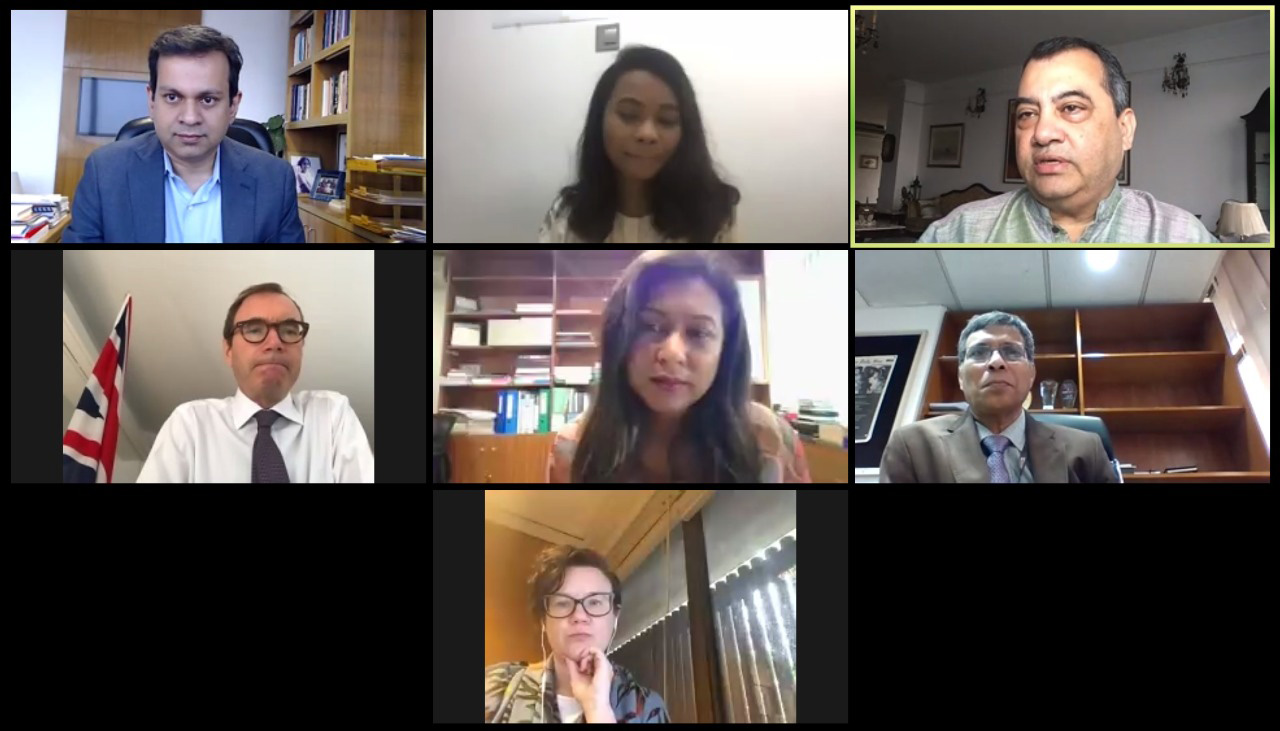
“Bangladesh has been a distinguish exemplar on how to adapt to climate change impact and the effectiveness of responding to extreme weather events and extra ordinary achievement in reducing climate change vulnerability through adaptation”This afternoon, Thursday (10 December), the British High Commissioner Robert Chatterton Dickson made the following remarks as Special Guest of the virtual launch of the book titled ‘Building Resilience to Climate Change through Craftsmanship’, organised by BRAC Climate Change Programme. He also added, “People who are most vulnerable to climate change will be made worse off in future to due to increasing climate change impact and we have been working in Bangladesh in reducing the impact through our support in various sectors access to food, Water ,sanitation, education, health.
“BRAC with Aarong is building resilience of individual by supporting artisans in order to support their families and link the village people with commercial market making it more sustainable.”
The book illustrates the ways BRAC’s sister concern, the Ayesha Abed Foundation, works to transform communities from areas at risk from climate change into ones that are resilient. The book features stories from the lives of 14 artisans, offering an insight into their sufferings due to climate change. In addition, it also goes on to portray their lives’ struggles, and how through employment at the Ayesha Abed Foundation the artisans took opportunities to utilise and maximise on their potentials and skills.
Chairman of the Standing Committee on Ministry of Environment, Forest and Climate Change, Saber Hossain Chowdhury, MP graced the webinar as Chief Guest. Chaired by Asif Saleh, Executive Director of BRAC Bangladesh, the webinar was also graced by the presence of Dr Ainun Nishat, Adviser to the Center for Climate Change and Environmental Research and Ex-Vice Chancellor of BRAC University, Tamara Hasan Abed, Managing Director of BRAC Enterprises, Kate Sangster, First Secretary of the Australian High Commission and Head of DFAT, and others.
Chief Guest Saber Hossain Chowdhury remarked “This book is not just a publication. It’s a story of Bangladesh. Bangladeshis has the natural ability to confront adversity and smile”
“Climate change impact will intensify and the recurrence of the climate hazards will increase in future. It is not practically possible to completely mitigate the impact of climate change. But we can fight through it by building our resilience and that’s exactly what BRAC has been doing.”
“Aarong is helping people to help themselves in building their resilience. Occurrence of multiple hazards at the same time is always going to test our ability to adapt to the adversity imposed by climate change. Initiative like this is what sustains Bangladesh by building the resilience of its most vulnerable people”
Partaking in the discussion on the published book, Tamara Hasan Abed, Managing Director of BRAC Enterprises, said, “The book portrays the stories of Aarong’s artisan living in climate change hotspots and greatly impacted by climate change. The stories in this book resonate the deep connection Bangladesh has both with its heritage crafts and rivers that fed this land. Climate change impact is felt by us all. These are the stories of people who are worse affected by the impact of climate change and now they have learnt to adapt and live. These are stories behind the labels that many of us have hanging in our closet”.
Kate Sangster, First Secretary of the Australian High Commission and Head of DFAT, noted “Climate change affects the poorest particularly the women and girls. What’s beautiful about this book is that it shows how decent and dignified work can help vulnerable people give back the autonomy that will help them to absorb and cushion the shocks of climate change and thus build their resilience in the process.”
Asif Saleh, Executive Director of BRAC Bangladesh and Chairperson of the webinar, reflected Bangladesh is one of the countries most vulnerable to the impacts of climate change, and the people who live in the districts showcased in this book are being hit the hardest. The stories of these artisans are testament to that, illustrating the impact that sustainable livelihoods.
Notably, the Ayesha Abed Foundation currently has 15 production centers and 696 sub-centers spread across the country where products for Aarong are manufactured. Most of these production centres are situated in areas under risk from climate change.
Book link : https://brac.net/downloads/resilience.pdf
Data underscores that gender-based violence is rising with COVID-19

Dhaka, Bangladesh –December 1, 2020 – BRAC today released new data on gender-based violence in conjunction with 16 Days of Activism Against Gender-Based Violence. The 16 Days are recognized annually from November 25, the International Day for the Elimination of Violence against Women, to December 10, Human Rights Day. The data released by BRAC is as follows:
Over 25,000 Complaints of Gender-Based Violence were Received by BRAC Legal Aid Services in Bangladesh in the First Ten Months of 2020
Even with restricted mobility because of lockdowns for a limited time, a total of 25,607 complaints of gender-based violence were received by BRAC’s 410 Human Rights and Legal Aid Clinics across Bangladesh in the first ten months of 2020.
Of these complaints, 15,047 were resolved through alternative dispute resolution; legal counsel was provided to 3,239 survivors, and 1,724 complaints led to civil and criminal cases being filed. In addition, almost $USD 4 million in dower and maintenance was recovered for survivors.
This spike is supported by data from Polli Shomaj, BRAC’s community-based women's groups, who reported a 24% rise in incidents of gender-based violence
Polli Shomaj are active in 54 out of 64 districts in Bangladesh and work to stop violence and help women understand their rights. They reported a 24% rise in incidents of violence against women in 2020 compared to 2019.
Greater Pressure on Teenage Girls in Bangladesh to Submit to Child Marriage Amid COVID-19
The number of child marriages reported by Polli Shomaj in the first 10 months of 2020 grew by 68%, compared to the same period in 2019. There was also a 72% rise in the number of child marriages prevented by the women’s groups during the same period.
In the third quarter of 2020, with COVID-19 widespread, the number of child marriages prevented was 219% higher than the same period in 2019. The number of child marriages prevented rose by 571% from the first quarter of 2020 to the third quarter of 2020.
The quarterly comparisons are as follows:
|
Months |
Number of Child Marriages that Polli Shomaj prevented in 2019 |
Number of Child Marriages that Polli Shomaj Prevented in 2020 |
|
January- March |
96 |
79 |
|
April-June |
109 |
75 |
|
July-September |
166 |
492 |
|
Total |
371 |
646 |
The rise in child marriage is particularly concerning because child brides are more likely to experience gender based violence
Globally, girls who marry before the age of 15 are almost 50% more likely to experience physical or sexual violence from a partner than girls who married after 18. Child brides are also more likely to believe that a man is justified in beating his wife.
“Combating gender-based violence and ensuring gender equality is top priority for BRAC, and the COVID-19 pandemic is only making the fight harder,” said Asif Saleh, Executive Director, BRAC Bangladesh. “BRAC has major initiatives, highlighted above, that demonstrate that with community mobilization and awareness, significant progress can be made in tackling this challenge. During COVID-19, It is more important that ever that a more concerted commitment and effort are made from all tiers of government and society to ensure that gender-based violence is stopped and rights of women are protected.”
1st death anniversary of Sir Fazle Hasan Abed on 20 december

BRAC commemorates its founder Sir Fazle Hasan Abed on his first anniversary of death tomorrow on Sunday (20 December). Last year (2019) he died on this day at a hospital in Dhaka.
No elaborate events, however, will be organised to commemorate the day due to the ongoing Covid situation.
BRAC and BRAC University have organised online discussion sessions, paying respect to the vision of life and values that Sir Fazle cherished in his life. All the members of BRAC staff in their commemoration remember the eternal source of inspiration that the founder will continue to be in their life. They have pledged to stand beside the poor and marginalised communities and work hand in hand to build an equal for all.
Sir Fazle established BRAC in 1972 as a small relief and rehabilitation effort carried out in a remote area of Sylhet division. That organisation transformed itself to one of the largest and effective NGOs of the world through successful socio-economic programmes in many sectors carried out in last 47 years. BRAC now stands as a unique ecosystem interweaving microfinance, social enterprises, university, bank and multidimensional investments targeting the development of the poor and marginalised people. It now provides multifaceted services to over 100 million people in 12 countries of Asia and Africa, assisting them in bringing lasting changes in their lives.
About Sir Fazle Hasan Abed
Sir Fazle was born in 1936 in Bangladesh. He studied accountancy in London, qualifying as a cost management accountant in 1962. While he was working as a senior corporate executive at Pakistan Shell Oil, the 1970 cyclone and 1971 Liberation War in Bangladesh dramatically changed the direction of his life. He left his job and moved to London, where he helped initiate Action Bangladesh and HELP Bangladesh in support of the Liberation War.
Early in 1972, after the war was over, he returned to the newly-independent Bangladesh, finding the economy in ruins. The return of 10 million refugees who had sought shelter in India during the war called for urgent relief and rehabilitation efforts. Sir Fazle established BRAC to address the needs of refugees in a remote area of north-eastern Bangladesh, guided by a desire to help people living in poverty develop their own capacity to better manage their lives.
Today BRAC is one of the largest NGOs in the world, operating across 11 countries in Africa and Asia. Its primary objective is to empower people living in poverty and inequality. In 2020, for the fifth year in a row, BRAC was ranked first among the world’s top 500 NGOs by Geneva-based NGO Advisor; based on its impact, innovation and sustainability.
Awards and Recognition
Sir Fazle was honoured with numerous national and international awards for his achievements in leading BRAC, including the Yidan Prize for Education Development (2019), LEGO Prize (2018), World Food Prize (2015), Spanish Order of Civil Merit (2014), Inaugural WISE Prize for Education (2011), David Rockefeller Bridging Leadership Award (2008), Inaugural Clinton Global Citizen Award (2007), UNDP Mahbubul Haq Award for Outstanding Contribution to Human Development (2004), Olof Palme Prize (2001) and Ramon Magsaysay Award for Community Leadership (1980).
He has also been recognised by Ashoka as one of the ‘global greats’; and is a founding member of its prestigious Global Academy for Social Entrepreneurship. He was a member of the Commission on Health Research for Development (1987-90), the Independent South Asian Commission on Poverty Alleviation (1991-92), and the High-level Commission on Legal Empowerment of the Poor (2005-2008). In 2010, he was appointed Knight Commander of the Most Distinguished Order of St. Michael and St. George by the British Crown in recognition of his services to reducing poverty in Bangladesh and internationally. Sir Fazle was a member of the Group of Eminent Persons appointed by the UN Secretary-General in 2010 to advise on support for the Least Developed Countries. In 2014 and 2017, he was named in Fortune Magazine’s List of the World’s 50 Greatest Leaders. Sir Fazle was honoured with a Dutch Knighthood in 2019.
LGRD minister at seminar on urban development: Rural areas to be transformed into planned urban spaces to house rising urban population

The minister for local government, rural development and cooperatives, Md Tajul Islam, stressed that the urbanisation in Bangladesh should essentially follow the direction our prime minister has given to transform the rural areas into urban spaces. “If we cannot accommodate people migrating into the urban areas we must transform the rural areas into pre-planned urban ones,” he said.
The LGRD minister made these observations in his chief guest’s speech today on Thursday (3 December) at an online seminar on housing and livelihood development of the urban poor communities.
The minister further emphasised that only putting the rising urban population into high-rises will not provide sustainable solutions until the communication is eased, and other problems related to logistics and utilities are taken care of. Therefore, urban resilience is an absolute necessity.
The seminar titled “Pro-poor, climate and disaster resilient urban development: Challenges and opportunities” was organised by BRAC Urban Development Programme (UDP) and attended by 20 city and municipality mayors from around the country.
Asif Saleh, executive director, BRAC, Professor Dr Akhter Mahmud, president, Bangladesh Institute of Planners (BIP), and Dr Imran Matin, executive director, BRAC Institute of Governance and Development (BIGD), BRAC University, also addressed the seminar, among others. Dr Ainun Nishat, Professor Emeritus, Centre for Climate Change and Environmental Research (C3ER), BRAC University, moderated the event. BIP, C3ER and BIGD also assisted in organising the seminar.
Professor Ainun Nishat appreciated the municipalities and city corporations of the country for their intent work on their development plans while drawing on own resources to address the growing challenges. He further said, “Empowerment of local government institutions, deliverable activities and social accountability are imperative for pro-poor, climate-resilient and sustainable urban development.”
DNCC mayor Atiqul Islam observed that many problems of the urban poor can be addressed through sustainable slum management in Dhaka city. While he asked for BRAC’s assistance in proper slum management in his jurisdiction, they mayor also stressed the importance of community members’ active involvement in monitoring the quality of service delivery of the city corporation staff.
Satkhira municipality mayor Md Tazkin Ahmed said trained and skilled manpower is essential for a municipality to do quality service delivery to its residents.
BRAC executive director Asif Saleh observed that for creating a robust and sustainable urban area empowerment and resource planning capacities of the local government bodies are two vital issues. “It’s important that the local authorities have been given the power to take actions in solving the local issues. Still there are issues of providing the mayors with planned budgets and required authority to approve action plans that need to be addressed. Though the condition of the capital city has improved from before as its mayors have more authorities now, it must also take place in all the other cities,” he further said.
BRAC partners with Handicap International-Humanity & Inclusion (HI) to improve the lives of people with disabilities

BRAC has partnered with Handicap International-Humanity & Inclusion (HI) in Bangladesh to launch a pilot disability-inclusive ultra-poor Graduation programme targeting the ultra-poor populations in four districts of Bangladesh. On 24 November 2020, Shameran Abed, Senior Director, Microfinance and Ultra-Poor Graduation initiative of BRAC, and Rajesh Chandra, Country Director of HI signed the agreement in Dhaka, Bangladesh.
BRAC has been committed to strengthening inclusion of people living in ultra-poverty as well as people with disabilities through its Graduation programme, and in 2018 collaborated with Handicap International-Humanity & Inclusion United Kingdom (UK) to bring in disability inclusion in its global programmatic activities.
In this pilot programme, HI will tailor its technical assistance to the specific needs of BRAC’s UPG programme. BRAC will implement the programme targeting 1,200 participants with disabilities or a family member with disability to enhance their socio-economic development. This two-year partnership will cater to the needs of the participants and their households during the 24-months programme cycle.
Terming the partnership between BRAC and HI as a ‘milestone’ in BRAC’s endeavour to make Graduation programme more inclusive to the most marginalised and vulnerable groups, Shameran Abed said, “The strategic partnership will strengthen our collective effort to lift people with disabilities out of ultra-poverty. This will enhance BRAC’s capacity to implement disability inclusive Graduation approach at scale in Bangladesh and globally, and assist respective governments to adapt the approach based on the country context”. Rajesh Chandra from HI also said, “Aligned with its worldwide strategy to ‘leave no one behind’, Handicap International – Humanity & Inclusion (HI) is delighted to extend in Bangladesh its global collaboration with BRAC. This technical partnership will support economic empowerment of people with disabilities in four districts of Bangladesh. HI, along with other organisations of people with disabilities aspires to support the Government of Bangladesh to ensure inclusion of people with disabilities in development”.
Since its inception in 2002, BRAC’s UPG programme has served almost 2.1 million ultra-poor households to achieve socio-economic resilience. Its groundbreaking Graduation approach has provided a proven pathway out of extreme poverty. BRAC’s work in Bangladesh is supported by Foreign, Commonwealth & Development Office (FCDO) and Australian Government’s Department of Foreign Affairs and Trade (DFAT).
Join the world’s biggest family

